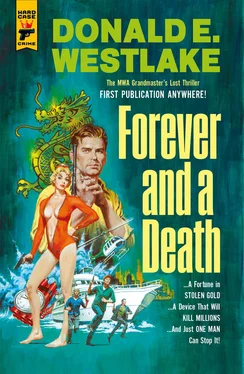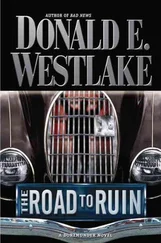“He will,” Jimmy said. “At eleven-thirty, after your tea.”
Brevizin laughed. “You already told him to call, and when? Jimmy, you do know me too well.”
“And later,” Jimmy said, “you’ll tell me all about it.”
Brevizin’s first impression of George Manville, when the man arrived for his two-thirty appointment that afternoon, was not encouraging. He had a scuffed and ragged look about him, the hangdog manner of the already defeated. Well; adversity can take it out of a man.
Later, he would wonder if that first impression had simply been his expectation of what the man in today’s newspaper would be, or if in fact Manville had been that close to despair. Impossible to tell.
So here he was, recommended by the far-off friend of a business acquaintance. The things we get into, Brevizin thought, and came smiling around the vast desk as Angela let the fellow in. “Mr. Manville, how are you? Did Angela offer you coffee, whatever?”
“Nothing, thanks,” Manville said, and turned to smile a bit wanly at Angela. “Thanks.”
“It was easy,” she assured him, and backed out, smiling, and shut the door.
So Angela’s taken with him, Brevizin thought. Her instincts were usually good. “Come sit over here, it’s more casual,” he said, gesturing to the conversation area, an L of soft gray sofas and a large distressed-wood coffee table.
They sat catty-corner, and Brevizin leaned forward to touch the long pencil resting on the yellow legal pad he had waiting there. “All I know about you, Mr. Manville,” he said, “is what I read in the Sydney Morning Herald .”
“I’ve made the Wall Street Journal , too,” Manville said.
“Not in the way you’d have preferred.”
“No.”
“Jimmy Coggins says you deny the charge.”
“I don’t know Mr. Coggins,” Manville said, and met Brevizin’s eye. “Talked with him once on the phone, that’s all. I appreciate what he’s done, I’m grateful. But I don’t really mean anything to Mr. Coggins, so if you decide, at some point, you don’t want any more to do with all this, it’s okay.”
Brevizin found himself surprised and somewhat interested. Normally, a fellow in George Manville’s situation would cling to whatever help or encouragement he could find. To begin the conversation by assuring Brevizin that Jimmy Coggins wouldn’t go to the wall for him was unexpected. He said, “Thank you. But let’s not part company just yet. I really should hear your story.”
“I’d appreciate it. The first thing,” Manville said, “is that the published story is one hundred percent false. Curtis made it up. I’ve never met this man Bendix, never heard of him before last night. The documents Curtis is talking about are pretty vague, I couldn’t tell from the newspaper exactly what they were, but they don’t sound like things I ever had access to.”
“You’re saying Richard Curtis has gone out of his way to tell whole-cloth lies about you.”
“Yes.”
“And that he swore false statements in having that warrant made out.”
“Yes.”
“Not a thing we’d expect from a man in his position,” Brevizin pointed out.
Manville’s smile was bleak. “Part of the problem,” he said, “is that Curtis’s position is not what everybody thinks it is. I know the truth, and I know more than that. I suppose he thought I might talk, go to the police myself, so he did this... what do they call it? Pre-emptive strike.”
“What is the truth, Mr. Manville?”
“Curtis is broke,” Manville said, “or worse than broke. Conning his business partners, going deeper into debt every minute. He over-extended when he was trying to protect his Hong Kong businesses from the Chinese, and he hasn’t been able to get back.”
Brevizin dropped the pencil onto the pad and leaned back. He would have a story for Jimmy Coggins after all. Smiling at Manville, he said, “The reason I’m beginning to believe you, Mr. Manville, I myself have heard some very vague rumors that Richard Curtis might be in some sort of financial trouble. This firm’s corporate clients include a number of builders, some private bankers, venture capital investors, people who have had or might have dealings with Curtis’s companies. People are beginning to tell one another to be careful of doing business with Richard Curtis, though nobody knows exactly what the problem is.”
“He’s his own Ponzi scheme,” Manville said. “He’s losing money every day, and he has to keep bringing more in to keep the facade going. And he knows it can’t last much longer. I didn’t know there were already rumors starting about him, but he may know.”
Brevizin said, “He told you how much trouble he was in?”
“Yes. He was trying to enlist me on his side.”
“In what?”
“I’m not sure,” Manville said, and spread his large hands, workman’s hands. “He told me he had a way out, it was illegal and dangerous, but it was going to make him a whole lot of money, and if I kept quiet my share would be ten million U.S. dollars, in gold.”
Brevizin squinted. “He said what?”
“Now you’re beginning to not believe me again,” Manville said. “Mr. Curtis told me my share could either be ten million dollars in gold or, if I’d wait a little while, the same amount in a Swiss bank account. I think I was supposed to be impressed.”
“Why were you having this conversation?”
Now Manville too sat back in the sofa, though he didn’t seem very relaxed. He said, “I’ve been working for Mr. Curtis for over a year, on a project out by the barrier reef. I’ve been developing a new technical way to deal with landfill, a cheaper way to convert land to new uses, and we just tried it, Tuesday of this week.”
“Tried it.”
“We set off measured explosions in tunnels in an island out by the reef,” Manville explained.
“That sounds risky.”
“It isn’t, really,” Manville said, “but we did have some environmental protesters, from a group called Planetwatch.”
“Oh, you touch another button,” Brevizin told him. “Planetwatch has been an irritation to more than one of my clients. Including Jimmy Coggins, come to think of it. All right, what happened?”
“A diver from their ship,” Manville told him, “a woman, went into the water just before the explosions, even though they’d all been told there was no fail-safe, no way to stop the countdown. Which was my fault, I should have taken every contingency into— Well. That doesn’t matter here.”
“She was in the water, near the island, when your explosions went off?”
“Yes.”
“And she was killed.”
“Well, no.” Manville did that bleak smile again. “Though Mr. Curtis would have preferred it. For a while, we all thought she was dead, but she survived. And then Curtis wanted to kill her, as though the explosion — or the shock wave, really — had done it, in order to get Planetwatch off his back.”
Brevizin said, “Mr. Manville? Are you sure?”
“Absolutely. It was because I didn’t want him to do it that he told me what his situation was, and offered me the ten million dollars.”
“If you’d kill the girl?”
“No, simply if I’d step aside.”
Brevizin looked over at the window, then back at Manville. “You’re saying he’s that desperate.”
“I think anybody would be,” Manville said, “in his situation. There’s a fellow with Planetwatch named Jerry Diedrich...” He paused and looked at Brevizin.
Who shook his head. “Don’t know the name.”
“Well, for some reason, he has a personal vendetta against Richard Curtis, and shows up wherever Curtis is doing anything at all that involves the environment. Curtis definitely doesn’t want Diedrich around when he makes that move of his to get all the money, and he thought a dead diver could tie up Diedrich and Planetwatch in the Australian courts long enough for Curtis to finish whatever he’s doing.”
Читать дальше







![Дональд Уэстлейк - Enough [A Travesty (novel) and Ordo (novelette)]](/books/416846/donald-uestlejk-enough-a-travesty-novel-and-or-thumb.webp)
